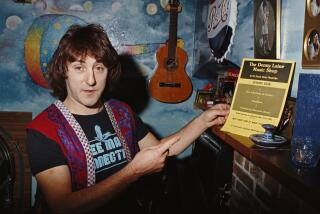Multi-platinum singer helped define soft rock
- Share via
Dan Fogelberg, the singer-songwriter whose hits “Leader of the Band,” “Part of the Plan” and “Same Old Lang Syne” helped define the soft-rock era, died Sunday at his home in Maine after battling prostate cancer. He was 56.
His death was posted on his website Sunday and announced in a statement by Anna Loynes of the Solters & Digney public relations agency.
Diagnosed with advanced prostate cancer in 2004, Fogelberg encouraged his fans to be aware of the disease and advised men to have annual prostate examinations.
Fogelberg’s heyday was in the 1970s and early ‘80s, when he scored several platinum and multi-platinum records fueled by such hits as “The Power of Gold” and “Leader of the Band.” Three of his albums went platinum and five multi-platinum.
His songs were powerful in their simplicity, and Fogelberg didn’t rely on the volume of his voice to convey his emotions. Instead, they came through in the tender delivery and his poignant lyrics. Songs like “Same Old Lang Syne” -- in which a man reminisces after meeting an old girlfriend by chance during the holidays -- became hits not only because of his performance but also for the engaging story line.
Fogelberg’s songs tended to have a weighty tone, reflecting on emotional issues in a serious way. But in an interview with the Milwaukee Journal Sentinel in 1997, he said they did not represent his personality.
“I’m not a dour person in the least,” he said. “I’m actually kind of a happy person. Music doesn’t really reflect the whole person.”
Later in his career, he would write material that focused on the state of the environment, an issue close to his heart. Fogelberg’s last album was 2003’s “Full Circle,” his first album of original material in a decade. A year later he received his cancer diagnosis, forcing him to cancel a fall tour.
Fogelberg was born in Peoria, Ill., on Aug. 13, 1951. His father was a band leader and his mother an opera singer. He played piano as a child and later began composing songs on the guitar. He attended the University of Illinois as an art student but dropped out after a couple of years when he became a hit on the Midwest coffeehouse circuit. He moved to Los Angeles in the late 1960s and opened several concerts for Van Morrison.
Fogelberg signed with Columbia Records in 1971. He released his first record, “Home Free,” in 1972, which was well-received by critics, but according to the reference Contemporary Musicians, was ignored by his own label. After being dropped by Columbia, he signed with Epic Records.
After joining Epic and coming under the management of Irving Azoff, his career began to flourish.
His 1974 album, “Souvenirs,” was produced by Joe Walsh and featured backing by Graham Nash, Glenn Frey and Don Henley. A single off the album, “Part of the Plan,” went gold.
His next two albums, “Captured Angel” and “Nether Lands,” went platinum and double platinum, respectively.
In 1978, he collaborated with flutist Tim Weisberg on the album “Twin Sons of Different Mothers,” which was a platinum seller. His 1979 release “Phoenix” sold more than 2 million copies.
For much of his career, Fogelberg lived on a ranch near Boulder, Colo. Although he was a solid touring act playing to sold-out venues, he never relished life on the road, preferring home life.
Survivors include his wife, Jean.
More to Read
The biggest entertainment stories
Get our big stories about Hollywood, film, television, music, arts, culture and more right in your inbox as soon as they publish.
You may occasionally receive promotional content from the Los Angeles Times.










